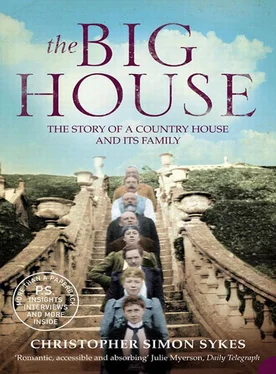At first her condition appeared to be improving. ‘I am happy to say my Mother is much better,’ wrote their son Christopher to his brother Tatton, ‘and in a very fair way of Recovery.’ Though it was at a cost. ‘This man puts her to a great deal of pain,’ he continued, ‘& I have to go to him every Morn. above three miles off. In short for what she undergoes with him, she deserves her health. From his account the Complaint has been long coming on, & will be long in getting the better of it.’ 62 In February, an Irish friend, the Hon. William Skeffington, wrote to inquire after her health. ‘I have felt much for Lady Sykes during the recent severe weather,’ he told her husband, ‘I am very impatient to hear that it has not thrown her back & flatter myself your next will give a good acct. of her recovering with Dr Hall.’ 63
June found the Sykeses in Bath, with Bessy apparently no better. ‘I was happy to find … that you had arrived safe,’ wrote George Britton to Christopher, ‘and found Lady Sykes not worse than might be expected from her late Relapse; I hope the Change of Air, Journey and Benefits of the Bath Waters will be of infinite service.’ 64 By far the most popular and fashionable form of treatment of the day was ‘taking the waters’ at one of the many spa towns, such as Harrogate, Bath and Weymouth. This consisted of both drinking the mineral waters and taking prolonged baths in them. Recent studies have shown that there was indeed great benefit to be gained from doing this, particularly for those people who suffered from diseases caused by lead poisoning: full immersion of the body in water for several hours increases the excretion of urine from the body, and out with it goes a significant amount of lead. Drinking a large quantity of the waters has the same effect. They were, proclaimed an eighteenth-century postcard, ‘wonderful and most EXCELLENT agaynst all diseases of the body proceeding of a MOIST CAUSE as Rhumes, Agues, Lethargies, Apoplexies , The Scratch, Inflammation of the Fits , hectic flushes, Pockes, deafness, forgetfulness , shakings and WEAKNESS of any Member – Approved by authoritie, confirmed by Reason and daily tried by experience.’ 65
While Christopher and Bessy were benefiting from their daily immersions, George Britton, who had succeeded to the post of his Steward, after the death of the faithful Robert Dunn in January, 1795, conducted a regular correspondence, keeping them informed about everything which went on at Sledmere in their absence, and answering Christopher’s endless inquiries. On 2 June it was a piece of ornithological news: ‘I have occasion to write till near 12 o’clock two nights,’ he told them, ‘at which late hours I heard the two Nightingales distinct. After opening the Window they filled my Room with Melody, their different Notes exceeded everything.’ On 9 June he described the disastrous unpacking of a new carriage: ‘Truslove went to unpack it and set it up & Mrs Rousby brought it here. Truslove informs me that it was very ill packed. The rats while on shipboard have eaten the greater part of the leather trunk behind …’ A fortnight later he gave an account of how the garden was looking. ‘The Laburnums are just showing the Flower Bud, the Apple Trees in full Blossom, so are Strawberries, the former in abundance, the White Thorn not out yet, every Hedge and Tree will be full, one may just perceive from the House a whitish cast from the tops of the single trees in the Lawn, old Ash not yet in full leaf.’ By the end of the month he was able to write ‘I am very glad to hear that Lady Sykes continues gathering strength’, adding rather wistfully ‘I wish you all had a Month of Sledmere Air.’ 66
After Bath they went to Weymouth, the most fashionable of all the resorts, being the favoured haunt of the King and Queen. ‘I suppose you are now so great with Royalty & Royal Parties,’ William Skeffington teased Christopher, ‘that you could hardly enjoy the humble Society of the family’, though he added ‘I most sincerely hope Lady Sykes will receive benefit from Sea Bathing.’ 67 One blessing of this particular stay was that the weather was warm, which George Britton hoped would ‘speed her Ladyship’s recovery’. In the meantime he continued his reports from home. ‘We have had three or four charming Hay days in the course of last Week which have enabled us to … get into stack in very good condition.’ ‘Currants are very plentiful,’ he wrote of the garden. ‘The servants took at the same time two fine melons and a small Pine.’ In the autumn they returned to Bath for more of the waters. ‘I’m sorry to find by your two last letters that your colds seem to hang on,’ Britton wrote to them there, adding ‘the Change of Weather will I hope soon remove them’. 68
There are continuous anxious references to Bessy’s health in Christopher’s correspondence over the next two years, and in 1801 he fell ill himself. The first indication that all was not well came in a letter sent by George Britton to Christopher while he was en route to the Hotwell Spa at Bristol, whose mineral waters had a reputation as a cure for diverse ailments such as kidney complaints, ‘hot livers’ and ‘feeble brains’. 69 ‘Your Health was particularly enquired after by all the Gentlemen at Driffield,’ he wrote on 30 August. ‘I hope you are approaching near to Bristol when you will then be relieved from Fatigue of Travel and I trust in a little time you will be gathering strength so as to bring about a speedy Recovery.’ A few days later they had still not reached their destination and Britton was writing ‘we are all sorry to find that your travel was slow and irksome’, adding ominously ‘I was very sorry to find that upon the whole you had gathered little strength.’
By 13 September the party ‘had all reached Clifton safe and met with a comfortable situation’. But all was not well. ‘I am equally sorry to find,’ Britton told Christopher, ‘that the State of your Health appears not in any shape to improve, God grant a Change for the better.’ His letter was then filled with the usual account of the day-to-day goings on at his beloved Sledmere. Richard Beaumont had sent ‘a small Box containing a Gate Sneck … the Kind is very simple and may be of use for Hand Gates, the one sent is to be let into stone but with a little Alteration may be made do for Wood’. The gardeners would ‘attend to the new planted trees in time, Cole to the new paled trees agreeable to your directions. I cannot see that the Deer or Horses have disturbed the trees in the Park since you left Sledmere.’ The hay stacks had all been ‘thatched without a Wisp of Hay damaged’, but there were ‘only five Bunches of the Raisin Grape, three of which are spoiled by Mildew occasioned by the steam or Vapour rising from the Tank in the Vinery’. There had been ‘a fine week of Harvest Weather … I have got our Clover Stubble eaten with sheep and have begun to plow the same and from the appearance of the land shall be tempted to sow the same with a hardy kind of Red Wheat.’ 70
All this information was doubtless passed on to Christopher in answer to worries he had expressed over estate matters, and shows that even when he was supposedly resting at a spa, he was incapable of relaxing. Britton concluded his news as follows: ‘I think I have nothing more particular at this time to name – I remain with my ardent Wishes for your Recovery. Your obedient humble servant, Geo. Britton.’ It was the last letter he was ever to write to Christopher, who died four days later on 17 September aged fifty-two. No account exists of the manner of his death, but it is tempting to speculate that he died with Britton’s letter in his hand and Sledmere on his mind. What killed him is a mystery, though it was probably heart failure due to chronic fatigue brought on by a lifetime of overwork. ‘He has left an excellent character in every relation of life, whether public or private, and was, in every sense, an enlightened country gentleman .’ So ran his obituary in the The Gentleman’s Magazine , continuing ‘His early rising and great activity, both of body and mind, prompted the conduct of every plan of amending the state of the country, whether by drainage or inclosure, building or navigation: and his improvements extended themselves over a surface of nearly 100 miles. The Wolds of Yorkshire will be his lasting monument.’
Читать дальше












![Edward Ellis - Adrift on the Pacific - A Boys [sic] Story of the Sea and its Perils](/books/753342/edward-ellis-adrift-on-the-pacific-a-boys-sic-s-thumb.webp)